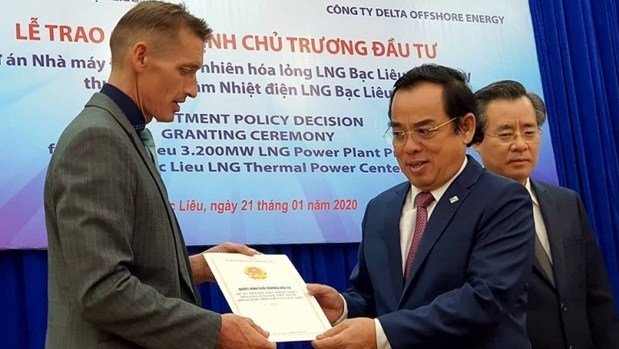
Foreign direct investment (FDI) pledges to Vietnam in the first three months of 2020 fell by a sharp 20.9% over the same period of 2019 to US$8.55 billion, according to the Foreign Investment Agency.

Bac Lieu province grants a permit for a foreign-invested LNG power station project. (Photo: VNA)
Disbursement also dropped by 6.6% year-on-year to US$3.85
billion, data as of March 20 has shown.
In the first quarter, Vietnam
licensed 758 foreign-invested projects worth a total of US$5.5 billion, mainly
thanks to a US$4 billion liquefied natural gas (LNG) power plant in the
southern province of Bac Lieu.
Such an investment made Bac
Lieu the largest recipient of foreign investment and power generation the most
attractive industry during the period.
Additional pledges to
existing projects and capital contributions and share purchases saw steep
declines to US$1.07 billion and US$2 billion, respectively.
With power generation
occupying the top place, manufacturing was the second most attractive sector
with US$2.72 billion, followed by wholesale and retail with US$682 million.
Ho Chi Minh City was the
second largest recipient of foreign investment with over US$1 billion while the
southern province of Tay Ninh came third with US$506.8 million.
A breakdown of investors
shows that Singapore made the largest investment in Vietnam in the
January-March period with US$4.54 billion, followed by Japan and China with
US$846.7 million and US$815.6 million, respectively.
As of March 20, there were
over 31,600 active foreign-invested projects in the country with total pledges
of US$370 billion, of which 58.3% had been disbursed.
Source: NDO
According to data from the Hoa Binh Provincial Party Committee, the industrial production index for the first six months of 2025 is estimated to have increased by 20% compared to the same period last year. This marks the highest year-on-year growth rate for this period since 2020.
In the first six months of 2025, Hoa Binh province’s export turnover was estimated at 1.145 billion USD, marking an 18.11% increase compared to the same period in 2024. Import turnover was estimated at $ 804 million, a 17.15% increase, which helped the province maintain a positive trade balance.
The lives of the ethnic minority farmers in Tan Lac district have gradually improved thanks to the new directions in agricultural production. This is a testament to the collective strength fostered through the professional associations and groups implemented by various levels of the district’s Farmers’ Union.
With the motto the "product quality comes first,” after nearly one year of establishment and operation, Muong village’s Clean Food Agricultural and Commercial Cooperative, located in Cau Hamlet, Hung Son Commune (Kim Boi district), has launched reputable, high-quality agricultural products to the market that are well-received by consumers. The products such as Muong village’s pork sausage, salt-cured chicken, and salt-cured pork hocks have gradually carved out a place in the market and they are on the path to obtaining the OCOP certification.
In the past, the phrase "bumper harvest, rock-bottom prices" was a familiar refrain for Vietnamese farmers engaged in fragmented, small-scale agriculture. But today, a new spirit is emerging across rural areas of Hoa Binh province - one of collaboration, organisation, and collective economic models that provide a stable foundation for production.
Maintaining growing area codes and packing facility codes in accordance with regulations is a mandatory requirement for agricultural products to be eligible for export. Recently, the Department of Agriculture and Environment of Hoa Binh province has intensified technical supervision of designated farming areas and packing facilities to safeguard the "green passport" that enables its products to access international markets.



